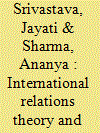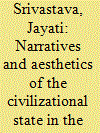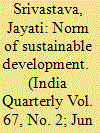| Srl | Item |
| 1 |
ID:
151200


|
|
|
|
|
| Summary/Abstract |
Mainstream international relations theory is consumed by its proclivity towards order; the genesis of which has been attributed to its statist ontology. Such theorisations, by drawing binaries between order and disorder, either assume or normalise order or obfuscate and suggest ways of mitigating any kind of disorder. Paradoxically, questions about the foundational edifice of order are marked by silences. Within the context of world order, this obtains a theoretical framework that precludes any normative reflection on the making and unmaking of world order or the principles that sustain that order. The article looks at how different branches of international relations theory envisage world order and the silences embedded therein. Further, by locating order and disorder inhabiting the same reality along a continuum, alternative readings of world orders are drawn from the critical theoretical traditions in which various articulations of justice impart normative pillars to the world order.
|
|
|
|
|
|
|
|
|
|
|
|
|
|
|
|
| 2 |
ID:
191715


|
|
|
|
|
| Summary/Abstract |
The term ‘civilizational state’ is used by emerging powers, including India, to mark themselves as distinct from the Westphalian states. This article addresses the following questions: why does India invoke this term despite its association with illiberal states? What ideological foundations and resources inform this narrative? And how does the ‘new’ India envision its role in international politics? Using an interpretive analysis of select texts and imagery, the article delineates the intellectual roots and aesthetic resources deployed by ‘new’ India to bring forth a civilizational state narrative which has become an important tool of power projection at both domestic and international levels. It argues that the recent shift from ‘civilization’ to ‘civilizational state’ draws its intellectual roots from early Hindutva idealogues. It is based on a conflict-ridden/homogenous understanding of civilization, making it ambivalent towards an inclusive/plural civilizational narrative articulated and nurtured by the nationalists. Internationally, the civilizational state narrative is geared towards reinforcing ‘new’ India's claim to be in the league of great powers; projecting itself as a power with a difference. Being the world's largest democracy helps in reinforcing this narrative, but signs of a shift towards a homogenous civilizational narrative will have wider implications for India's role in international politics.
|
|
|
|
|
|
|
|
|
|
|
|
|
|
|
|
| 3 |
ID:
105971


|
|
|
|
|
| Publication |
2011.
|
| Summary/Abstract |
The article engages with the theoretical debate on norms to explicate the prescriptive power of the 'norm' of sustainable development. It analyses the socio-economic and political context that have been instrumental in framing of the 'norm' of sustainable development, in particular the approach and interventions of developing countries including India. It argues that an ostensible dichotomy between development and environment has fractured the internal cohesion of the norm. The surrounding web of normative structure that marginalises principles of justice and equity is other formidable explanation for its fragile compliance.
|
|
|
|
|
|
|
|
|
|
|
|
|
|
|
|